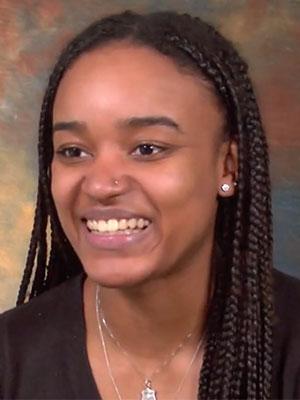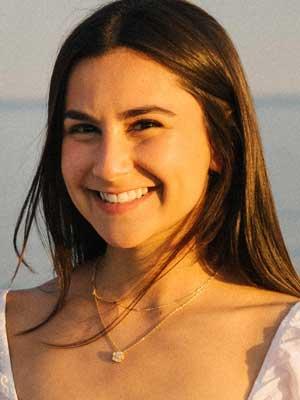
Master of Science (MS) in Occupational Therapy
Student & Alumni Spotlights
Student and Alumni Spotlights
Joelle DeLagarde
Tell us about your background and what led you to be interested in the field of Occupational Therapy.
I was born and raised in the New York City area. I always knew I wanted to work with people. During my middle school years, I interacted with an occupational therapist but did not understand what the actual job entailed. Initially, I thought I wanted to be a lawyer, so I went to a high school that had a law-based program. When applying to college, I realized I wanted to work in the health field. I entered college as a chemistry major with the intention of becoming a pharmacist. Throughout my time in college, I worked at the Career Planning office and narrow down which professions would work well with my skills, personality, and interests, which led me to occupational therapy. Remembering what I saw of the profession at a very young age, I started to do more research and changed my major to psychology. After doing an internship at an outpatient rehabilitation center with an occupational therapist, that experience solidified my decision to pursue this profession.
What attracted you to Hofstra University’s OT program?
What attracted me to Hofstra’s OT program was the location relative to where I live in Brooklyn, NY. I had also fulfilled many of the prerequisite requirements in my undergraduate degree. Hofstra’s OT program has a 100% pass rate for the NBCOT exam and since it was a newer program, the faculty really encouraged feedback from the students.
Tell us about your relevant experiences outside of the classroom. Share information about fieldwork and/or student organization experiences you’re taking advantage of.
I am currently the Vice-President of the Student Occupational Therapy Association (SOTA). This association gives students the chance to advocate and educate others about the profession as well as give back to other organizations. Some of the ways we do this is through walks for diagnoses such as cancer and autism and donations to people and countries in need.
My fieldwork experiences have been interesting so far. What I love most about our fieldwork experiences is that we are in a different setting every semester which gives students the chance to experience the many settings that occupational therapist practice in.
Describe your experience working and studying with faculty in the OT program.
My experience with the faculty has been amazing. The faculty are very supportive, and they want to see you succeed. They make themselves available as much as they can to help students with issues whether it be academic or personal.
What are your long term professional goals and how will the program help you reach them?
My goals and aspirations as an OT Practitioner are to work with children who have special needs as well as open a clinic in my neighborhood of Brownsville, New York. Opening a clinic in a lower socioeconomic neighborhood is very important to me because people who live in these neighborhoods are not afforded the same opportunities to health care as those who live in more prominent areas. This program will help me reach my goals by teaching me the skills I need to be a successful clinician, such as documentation and treatment techniques.
Why would you recommend this program to others?
I would recommend this program to others because the faculty really care about the students. From the interview process up until my last semester, I never felt like I was alone or could not speak to the faculty about any issues or concerns I was having. Hofstra turned into my second home, and I am excited for the incoming cohorts to come and have an amazing experience like I did.
Ashe Davis
Samantha Muchoney
Why did you choose Hofstra's OT program?
I chose Hofstra's OT program for a number of reasons. Firstly, its affiliation with prestigious hospital systems in the area, such as Northwell Health and the accessibility of commuting from home were factors. The program's location and connections were essential in providing well-rounded clinical experiences that would prepare us for entry-level practice. Additionally, the group interview format during the admissions process was intriguing to me. It allowed for interesting discussions and interactions among interviewees, giving me a sense of the collaborative and engaging atmosphere at Hofstra.
What are some of the profound lessons you learned in the OT program?
One of the most significant lessons I learned during my time in the program was the importance of keeping an open mind about my specialty. I initially thought I wanted to start my career in adult acute care, but as I progressed through my rotations, I discovered my true passion in pediatrics. This experience taught me the value of exploration and adaptation in our field. Remaining open-minded and willing to explore diverse specialties is crucial in discovering where your true strengths and interests lie. Another lesson I learned was that academic excellence doesn't always translate to success in the field. So much of what we do relies on our innate ability to connect with clients, build rapport and trust, and demonstrate empathy.
What were your overall thoughts of the OT Faculty?
The faculty at Hofstra were highly supportive and played a large role in our development as future occupational therapists. Their guidance and mentorship helped shape our professional skills and knowledge. They consistently challenged us to be the best clinicians we could be, while also encouraging our critical thinking and personal growth.
What advice would you have for students thinking about studying OT at Hofstra?
If you're considering studying occupational therapy at Hofstra University, utilize the university's affiliations with prestigious healthcare institutions for clinical experiences and networking opportunities. The faculty, acting as both mentors and experts, can guide your journey and open doors to research projects and tailored career advice within Hofstra's network. Finally, prioritize developing strong interpersonal skills and empathy, and never stop advocating for your clients. Your Hofstra experiences might inspire you to pursue advanced certifications beyond NBCOT. In my case, they fueled my drive to obtain an advanced accessibility certification (CPACC), highlighting my dedication to delivering inclusive and equitable care. This certification enriches my practice and better equips me to address diverse client needs.


